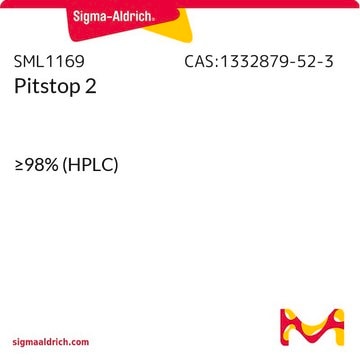SAE0087
Filipin III ready made solution
from Streptomyces filipinensis, 1mg/ml in DMSO based solution
Synonyme(s) :
Filipin III solution
Se connecterpour consulter vos tarifs contractuels et ceux de votre entreprise/organisme
About This Item
Code UNSPSC :
12352200
Nomenclature NACRES :
NA.77
Produits recommandés
Niveau de qualité
Pureté
≥95% (HPLC)
Forme
ready-to-use solution
Conditions de stockage
protect from light
Conditions d'expédition
dry ice
Température de stockage
−20°C
Catégories apparentées
Description générale
Filipin III is a polyene macrolide antibiotic and the major component isolated from cultures of S. filipinensis. 1 Due to its ability to fluoresce and bind to cholesterol, Filipin has been widely
used as a probe for sterol location in biological membranes 2 and has been used clinically as a stain for free cholesterol in the study of Type C Niemann-Pick disease. 3 Filipin inhibits prion protein (PrP) endocytosis and causes the release of PrP from the plasma membrane. 4 Filipin III was found to trigger signaling responses in tobacco cells, including a NADPH oxidase-dependent production. 5. The antifungal mechanism of action may be due to altering membrane permeability and associated functions by binding to membrane sterols. Filipin inhibits prion protein (PrP) endocytosis and causes the release of PrP from the plasma membrane.
used as a probe for sterol location in biological membranes 2 and has been used clinically as a stain for free cholesterol in the study of Type C Niemann-Pick disease. 3 Filipin inhibits prion protein (PrP) endocytosis and causes the release of PrP from the plasma membrane. 4 Filipin III was found to trigger signaling responses in tobacco cells, including a NADPH oxidase-dependent production. 5. The antifungal mechanism of action may be due to altering membrane permeability and associated functions by binding to membrane sterols. Filipin inhibits prion protein (PrP) endocytosis and causes the release of PrP from the plasma membrane.
Application
Filipin has been used in a double staining procedure as a probe for the detection of lipoproteins in polyacrylamide gel and immobilized on nitrocellulose membranes. It is also widely used to localize and quantitate unesterified cholesterol by virtue of a specific fluorescent complex.
Autres remarques
- Filipin III solution is very sensitive to air and light. Upon receipt aliquot and store at -20°C avoid freeze thaw cycles.
- Filipin III is used in various concentrations depending on the specific protocol used. Dilute 1mg/ml stock solution with appropriate buffer according to the used protocol.
- Filipin III interaction with cholesterol alters the absorption and fluorescence spectra, for visualization with a fluorescence microscope use excitation at 340-380 nm and emission at 385-470 nm (Filipin fluorescent staining photo-bleaches very rapidly, thus the sample should be analyzed immediately).
Code de la classe de stockage
10 - Combustible liquids
Classe de danger pour l'eau (WGK)
WGK 1
Point d'éclair (°F)
188.6 °F
Point d'éclair (°C)
87 °C
Certificats d'analyse (COA)
Recherchez un Certificats d'analyse (COA) en saisissant le numéro de lot du produit. Les numéros de lot figurent sur l'étiquette du produit après les mots "Lot" ou "Batch".
Déjà en possession de ce produit ?
Retrouvez la documentation relative aux produits que vous avez récemment achetés dans la Bibliothèque de documents.
Les clients ont également consulté
Pan Gao et al.
Investigative ophthalmology & visual science, 63(5), 32-32 (2022-05-27)
Bietti crystalline dystrophy (BCD) is a progressive retinal degenerative disease primarily characterized by numerous crystal-like deposits and degeneration of retinal pigment epithelium (RPE) and photoreceptor cells. CYP4V2 (cytochrome P450 family 4 subfamily V member 2) is currently the only disease-causing
Yun-Qi Zhou et al.
Emerging microbes & infections, 11(1), 1135-1144 (2022-03-29)
The spread of severe acute respiratory syndrome coronavirus 2 (SARS-CoV-2) and its variants is threatening public health around the world. Endocytosis functions as an important way for viral infection, and SARS-CoV-2 bears no exception. However, the specific endocytic mechanism of
Wen-Bin Zhang et al.
Acta neuropathologica communications, 11(1), 102-102 (2023-06-22)
Accumulating evidences reveal that cellular cholesterol deficiency could trigger the onset of Alzheimer's disease (AD). As a key regulator, 24-dehydrocholesterol reductase (DHCR24) controls cellular cholesterol homeostasis, which was found to be downregulated in AD vulnerable regions and involved in AD-related
Carla E Cadena Del Castillo et al.
Nature communications, 12(1), 4898-4898 (2021-08-14)
Hedgehog (Hh) signaling is essential during development and in organ physiology. In the canonical pathway, Hh binding to Patched (PTCH) relieves the inhibition of Smoothened (SMO). Yet, PTCH may also perform SMO-independent functions. While the PTCH homolog PTC-3 is essential
M A Castanho et al.
The Journal of biological chemistry, 267(1), 204-209 (1992-01-05)
The alterations in the absorption and fluorescence spectra observed for the polyene antibiotics filipin and nystatin in the presence of cholesterol are due to an exciton interaction (polyene aggregates) and cannot be attributed to a specific sterol-antibiotic complex. Filipin and
Notre équipe de scientifiques dispose d'une expérience dans tous les secteurs de la recherche, notamment en sciences de la vie, science des matériaux, synthèse chimique, chromatographie, analyse et dans de nombreux autres domaines..
Contacter notre Service technique














